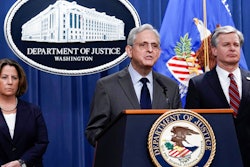BEIJING (AP) — China rejected "threats and blackmail" ahead of a threatened U.S. tariff hike, striking a defiant stance Thursday in a dispute companies worry could flare into a full-blown trade war and chill the global economy.
A government spokesman said Beijing will defend itself if U.S. President Donald Trump goes ahead Friday with plans to raise duties on $34 billion of Chinese goods in the escalating conflict over technology policy.
The dispute reflects foreign frustration with China's state-led industrial development strategy, which Washington, Europe, Japan and other trading partners say hurt their companies and violate its market-opening commitments. Americans worry that rising Chinese technological prowess might erode U.S. industrial leadership and prosperity.
Chinese President Xi Jinping's government has issued a list of U.S. goods for possible retaliation, but the Commerce Ministry said it will wait to see what Washington does.
"China will not bow in the face of threats and blackmail, nor will it be shaken in its resolve to defend global free trade," said ministry spokesman Gao Feng at a news conference.
"China will never fire the first shot," Gao said. "However, if the United States adopts taxation measures, China will be forced to fight back to defend the core interests of the nation and the interests of the people."
Friday's tariff hikes are the first stage in threatened U.S. increases on up to $450 billion of imports from China over complaints Beijing steals or pressures foreign companies to hand over technology.
Xi's government has expressed confidence China can hold out against U.S. pressure, but companies and investors are uneasy.
Trade worries are adding to anxiety over cooling economic growth and tighter lending controls that have hit real estate and other industries. The main Chinese stock market index has tumbled 12 percent over the past month.
Chinese exporters of tools, lighting and appliances say U.S. orders have shrunk as customers wait to see what will happen to prices.
Ningbo Top East Technology Co., which makes soldering irons in Ningbo, south of Shanghai, used to export 30 percent of its output to the United States, according to its general manager, Tong Feibing. He said American orders have fallen 30 to 50 percent compared with a year ago.
The company wants customers to split the cost of the tariff hike, but few are willing, said Tong.
"There is a chance the company will lose money and might go bankrupt," said Tong. "I will do whatever I can, including layoffs."
The ruling Communist Party has insisted on making changes at its own pace while sticking to a state-led industrial strategy seen as the path to prosperity and global influence. Officials in Beijing reject accusations of theft and say foreign companies have no obligation to hand over technology. But rules on auto manufacturing, pharmaceuticals and other industries require companies to operate through state-owned Chinese partners and share know-how with potential competitors or teach them how to develop their own.
Beijing has announced changes this year including easing limits on foreign ownership in insurance and some other fields. But none directly addresses the complaints that are fueling its conflict with Washington.
The U.S. also has irked some of its closest allies by hiking import duties on steel, aluminum and autos from Europe, Japan, Canada and Mexico.
"The global trade conflict is at risk of a serious escalation," said Adam Slater of Oxford Economics in a report.
Tariffs imposed so far by all sides affect about $60 billion of goods, or 0.3 percent of world trade, according to Slater. He said that would rise to a full 4 percent of the global total if Washington, Beijing and other governments follow through on tariff threats.
Forecasters say a full-blown conflict could knock up to 0.5 percent off global economic growth through 2020 if Washington and Beijing impose tariff hikes on $250 billion of each other's goods.
___
AP researcher Yu Bing in Beijing contributed.





















